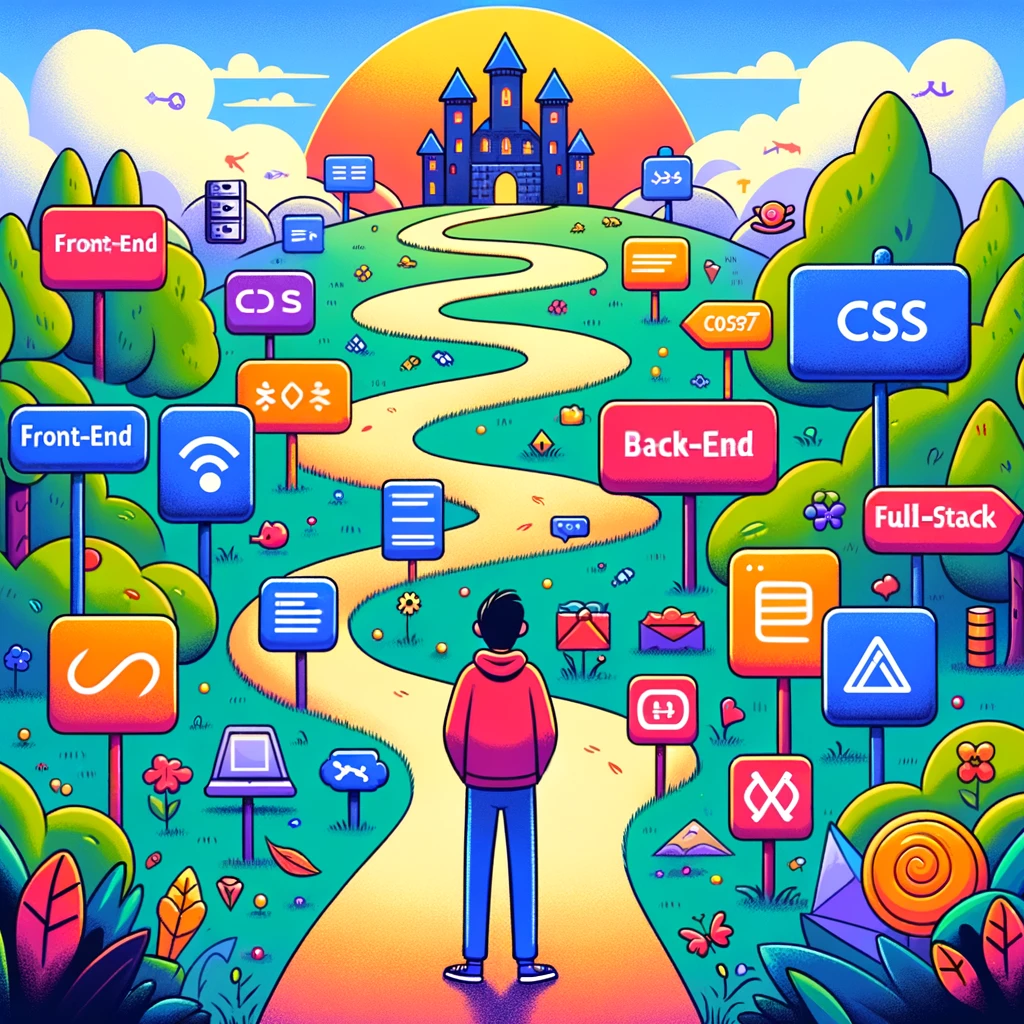Do you enjoy being creative with technology? How about coming up with an app idea that offers immense value?
If you love creating with technology that pursuing web development may be for you. But, what does it mean to be a web developer?

It’s not just about slinging code; it’s about crafting interactive experiences on the web. Whether you’re tinkering with the visible parts of a website as a Front-End Developer, orchestrating the server-side magic as a Back-End Developer, or doing a bit of both as a Full-Stack Developer, the goal is the same: to make something functional and engaging.
To become a great web developer a lot of skills come into play. Sure, you need to be friends with programming languages and frameworks, but there’s more to it. Technical skills will get your foot in the door, with proficiencies spanning from HTML to Python, and SQL to Git. But don’t overlook the soft skills – think of them as the glue that holds your technical know-how together. Effective communication, problem-solving, and meticulous attention to details are just as imperative in this role.
Why is this important? Because in today’s tech ecosystem, being a great web developer isn’t just about what you can do; it’s also about how you do it. Your ability to blend technical expertise with strong communication is what will set you apart.
This isn’t just about theory; I’m here to help you translate these skills into action. Next up, I’ll show you how to sidestep the traditional degree and go full-throttle into a web development career with confidence and competence. These next steps will show you how to become a web developer without a degree.
What About The High Competition?
I know many people who have great jobs and are self-taught or went to an online coding school. There are loads of resources online that you can use for training, so you don’t have to go to college and get a costly degree. No one has time for that.
Nowadays, many people want to be developers, more so now than before. There is a lot of competition, but the demand for software developers far exceeds the supply even with that.
Also, because the field is lucrative and not as stressful as other jobs, many people want to be developers. But I’ve heard stories from people that even though many people want to be developers, only a percentage of those have a passion for the field.
Blueprint to Bypassing the Degree Path
I’m here to help you with a game plan that doesn’t involve spending years in a classroom. The only way to get into web development is not spending $80,000 total over 4 years at a traditional university.
Picture developing websites and applications without ever setting foot on a college campus. That’s right, you can kick-start your coding career with resources that are often less costly and more time-efficient than traditional degrees.

Online courses and coding bootcamps have changed the game. They’re designed to get you job-ready, often slicing years off the learning curve. You want a curriculum that’s in sync with the rapidly evolving tech field, and that’s what these programs offer. They hone your skills in a wide array of relevant technologies like HTML, CSS, JavaScript, and more.
Now, don’t worry too much about the absence of a college degree hanging on your wall. Instead, focus on creating projects that show potential employers what you can do. Developing a portfolio site showcases your work and growth as a developer. It’s proof of your expertise, your commitment to learning, and problem-solving capabilities.
In a sea of developers, stand out with certifications. They’re like trust signals to employers, demonstrating that you mean business. Certificates from respected entities in the industry can give you an edge. They validate your skills and show that a recognized authority has put their stamp of approval on your abilities.
The Self-Made Developer: Crafting and Presenting Your Expertise
Imagine you’ve just completed an array of online courses and coding bootcamps. You’re brimming with knowledge and itching to apply it. That’s where crafting your expertise comes into play. Your first step is to ensure your learning translates into tangible skills, the kind that employers are scouting for.
Your portfolio is your storybook, a visual narrative of your accomplishments and capabilities. Begin by identifying problems you’re passionate about solving. Use these to shape projects that demonstrate your strengths, creativity, and adaptability. This isn’t just about showcasing your best code; it’s also about highlighting your journey and problem-solving prowess.

Perhaps you’ve built an e-commerce site or a mobile-responsive blog, or maybe you’ve contributed code to open-source communities. Include detailed case studies in your portfolio to illustrate your workflow, challenges encountered, and how you overcame them using your technical and soft skills.
Now, let’s focus on the resume. I’m going to tell you straight – it’s essential to pivot your resume to emphasize your web development projects and any relevant experience. Curate it to accentuate your specialized skill set and the value you bring to a potential employer. Explain how self-driven projects or freelance gigs have prepared you for the role at hand.
Preparing for the interview is crucial, and honesty will be your best policy. Be upfront about your unconventional education path, but underscore your unique experiences and self-taught expertise. Detail the learning platforms you’ve used, the projects you’ve tackled, and the technologies you’ve mastered. Convince them that your practical skills outweigh the absence of a traditional degree.
Remember, a robust online presence can complement your resume – maintain an up-to-date LinkedIn profile, a GitHub with your code, and any other platform where your work can shine. You’re not just presenting skills; you’re showcasing a willingness to learn and a commitment to your craft.
Navigating the Web Development Landscape: Opportunities and Earnings
You’re going to find out about the dynamic world of web development, where adapting to change is as crucial as the coding itself. The market for web developers is on a steady incline, with the Bureau of Labor Statistics eyeing a 16% rise in demand from 2022 to 2032. That’s a tall order and a clear signal that if you’re looking to enter the field, the time is ripe.

A fascinating aspect of a career in web development is the earning potential. With figures ranging from $61,000 to as much as $161,000 annually, your paycheck could vary widely. It’s not just a random lottery; factors like where you are, who employs you, the industry you’re in, and your experience play a part in determining where you fall within that range. If you’re eyeing the bigger slice of that salary pie, specialization and continued skill development are your best allies.
In terms of time investment, patience is your friend. For some, proficiencies light up quick—a mere 3 to 6 months through intensive online courses or bootcamps. If you’re marching to the beat of a different drum, taking it part-time, expect a year or so. Remember, your first attempt doesn’t need to be your last. Web development is an iterative process, and so is learning it.
Careers in tech are less about linear progression and more about continual growth. Your educational journey doesn’t end with a job offer—it’s merely a new beginning, a launchpad into a world of infinite digital possibilities.
Continued Growth and Learning in Web Development
It’s clear that stepping into the web development arena without a degree is more than just a starting point; it’s a continuous journey of education and adaptation. To keep your skills sharp and stay competitive, you need to immerse yourself in continual learning and self-improvement.
Don’t forget about the power of connections. Networking with fellow developers, joining tech communities, and engaging with industry professionals are invaluable for opening doors to new opportunities, gaining insider knowledge, and staying in tune with emerging trends.

Prepare to be a lifelong student of the craft. The web development field is dynamic, with new tools, frameworks, and design philosophies emerging regularly. Keep reading, coding, and learning to ensure that the websites and applications you build not only function well but also embody the cutting-edge of online innovation.
Tips
Now that you know that you do not have a degree, here are some tips to get a job.
Be curious, and pick up new technologies.
A curious mind in software engineering is necessary because the software engineering world has changed a lot. You need to dive in and do whatever it takes to keep up with these changes. Take online classes, read docs, or get mentored. Even though it’s essential to learn new technologies, you need to know the management tools used in the industry. Do you utilize Trello? It’s a popular tool for organizing tasks for a project.
Since Universities teach more theoretical than practical knowledge, new college grads have less experience writing production-level code. One of my senior developer friends said that I have more experience writing production-level code than college graduates because of my BloomTech experience.
I would suggest that when you take classes online or even go to an online coding school or Boot Camp, you write down what you’re learning and how you’re using what you know. This could be in the form of a blog post on Medium. Unfortunately, I didn’t practice writing blog posts when I started BloomTech, and I’m only just beginning.
Learn from my mistake, though. It’s essential to be curious about technology. However, when you are starting your programming journey, learn one technology at a time. If you do not do that, you might become overwhelmed, and you may want to quit.
It is better to develop expertise in one language over many months while developing apps in that language. If you follow that advice switching to another language will be easier.
The fundamentals and logic of programming languages are similar; just the syntax is different. You don’t want to be like the old saying, “Jack of all trades, master of none.
Build a Fantastic Resume and Cover Letter
Be sure to write a fantastic resume and cover letter. Whenever you apply for a job, tailor your resume to the job description. List your skills and your projects at the top.
Resume
When I was getting to the end of BloomTech(AKA Lamba School), career support gave me an excellent resume template to go by.
You want to highlight your achievements as bullet points underneath each job. Don’t just list them. Explain them in detail with power verbs based on the past or present tense.
Collaborated within cross-functional teams
Configured the application to deploy back end to Heroku and front end to Netlify
Translated UX Wireframes to Code
Cover Letter
How do you effectively write a cover letter? One keyword. RESEARCH. I put that in bold and upper case because I can not stress that enough.
Incorporate their mission statement and core values into a cover letter. Explain how you fit those values and the job description.
Do you need more help with writing a resume and cover letter?
You should definitely tailor your resume and cover letter for the job you want. If you are going for a ‘React’ job, make sure you list ‘React’ projects you have done. There are also things you should pay attention to like formatting, grammar, structure, and all those English-type things that we slept through in our English class.
There are a lot of resources on the web to get resume help. One particular resource that I like is MyPerfectResume. You can build a resume, but they ask you to sign up for a while to download. Don’t worry though it is really cheap. At most, it is 5 dollars.
Reach Out
Having a résumé and cover letter is important, but companies may have an ATS (Applicant Tracking System), that may auto-reject your application based on years of experience. This has happened to me a lot.
However, I have known people in school that has gotten auto rejected by an ATM has but still got an interview because they reached out to an Engineering Manager.
How Do You Reach Out?
I have created a separate article that goes into the details about reaching out to influential people in the company that will really help you as you apply.
Learn This Secret To Good Outreach
Devote Time To Personal and Professional Development
It is essential to be self-aware and to realize where you need to grow. I hate to tell you this, but if someone told you you’re perfect, they might be lying. I’m pretty sure they’re lying. I’m sorry, don’t get mad at me about it. I’m just telling you the truth.
Strengthen your weaknesses. This can look like professional development. Read some self-development books, take some online classes, or seek out mentorship. I have read many self-development books in the past that have helped me work with people better and understand everyone’s unique personality.
The following four books are ones that I recommend as part of your self-development journey.
- The 7 Habits of Highly Effective People – Stephen Covey
- The Magic of Thinking Big – David Schwartz
- How to Win Friends and Influence People – Dale Carnegie
- Personality Plus – Florence Littauer
Your cheapest bet to find these books are Amazon or the library. There are probably more great development books. Let me know of any others in the comments.
Own Up to Mistakes
Don’t play the blame game. Move on from your mistakes and acknowledge that you have made mistakes before. One thing employers love hearing is how you’ve learned from mistakes. Remember, a failure is an event, not a person. So, when you fail, acknowledge the event, fix it, learn from it and move on.
Employers love hearing about the time and effort you put into learning how to program. If you have a full-time 9-to-5 job and want to switch careers and learn to program on the side, employers will respect the effort.
I came from a different field and discovered that I wanted to change careers to programming. Even with a full-time job, sometimes I studied programming for hours.
Build Up a Strong Portfolio
Make a website with projects that you have done. I took a class where they guided me through making an e-commerce store, then took that inspiration and created an e-commerce store on the side.
Do you want guidance or ideas for developing side projects? I recommend online coding schools, like nucamp, Free Code Camp, CodeCademy, Udemy, or Coursera. I will be writing in-depth articles about these in the future. These are just a few resources that provide you with a structure and a curriculum to follow to develop a great portfolio to impress employers.
Next Steps
To sum it up, becoming a successful web developer without a degree isn’t just about conquering the technical mountain. It’s about journeying on an ever-evolving path of professional growth. Invest time in learning, building connections, and staying abreast of new developments, and you’ll find that your career can ascend to impressive heights.
If you’re hesitant about going into programming or are depressed about the high competition, remember that not everyone who wants to be a developer has a passion for it. YOU CAN DO IT. YOU CAN BECOME A WEB DEVELOPER WITHOUT A DEGREE even when others say you can’t.
I have a few questions to spark a conversation.
- Did you find this post helpful? If so, why?
- What are other ways that you can think of to help others stand out in their job hunt
Thank you for reading my post. Leave your comments below to participate in this engaging community. Be sure to sign up to receive updates of more incredible articles.
Share my article on social media and follow me on Twitter for extra content.
261 Followers
I have been in the web development industry since 2016. It is my desire to guide aspiring and seasoned developers alike through the complex landscape of web development and software engineering. I combine my academic prowess, with degrees from Western Governor University and a Boot Camp certificate from Bloom Tech, with real-world experience to educate and inspire.
As the force behind DevTuneUp.com, I offer a treasure trove of tutorials, how-tos, and insights into the ever-evolving tech industry. With a sharp focus on demystifying technology and a goal to make DevTuneUp.com a cornerstone for tech enthusiasts, I leverage my expertise in SEO optimization and social media marketing to reach and empower a global audience. Join me on this journey to navigate the digital world with confidence and skill.
Hi, I have tried getting into this and what I will say is that you have to be super smart. It’s true like you said you need to have some people skills but you also have to have some natural ability with this stuff because if you are dumb like me then your chances will be much less. So you should enjoy it also am I right?
Yes, but limit yourself and dont be self deprecating. I actually have an average IQ and a lot of people in tech do to
I’ve been considering a career shift into web development but was unsure about the feasibility without a formal degree. This article provided valuable insights and actionable steps to start this journey. Could you elaborate on the importance of networking within the tech community for someone transitioning into this field? How does one effectively network without having a strong technical background or connections in the industry?
I have utilized LinkedIn to work and that has gone well. Just search for software developers from the people feature and message them.
There is also tools that can supplement your learning like free code camp online, udemy, and pluarlsight
I sure could have used this article $25,000 ago lol. I definitely went into debt to obtain my associate’s degree in Graphic Design, which I do not use for the most part.
Had I known that I could have found these courses for free, I totally would have jumped on that versus tagging such a high price tag to my education.
I could have focused my studies on what I really wanted to learn as well versus taking courses that I struggled through, I did learn from my physics courses, but the quadrant expressions, I cannot tell you one thing from those courses!
I am going to look up a few of the HTML, CSS, and JavaScript courses, that is knowledge I could use every day as I have 4 websites and no money to spend on developers to assist.
I am on to Part 2: How To Get Started, after I finish dropping this line.
Stacie
Hello Jordan,
I love this comprehensive guide for individuals aspiring to become web developers without a traditional degree. The step-by-step approach, starting from bypassing the degree path to continued growth and learning, offers valuable insights into the evolving field of web development.
The emphasis on online courses and coding bootcamps as alternatives to traditional education is a practical and cost-effective approach for me. This is something that I can explore and develop skills for in my spare time. I do feel that is will be quite challenging but worth it in the end.
The section on becoming a self-made developer emphasises the significance of crafting a compelling portfolio, tailoring resumes to showcase relevant projects and preparing for interviews with honesty about unconventional education paths. The advice on maintaining a robust online presence through platforms like LinkedIn and GitHub adds a practical dimension to the guidance. This is also something that I can implement when I am trying to become more knowledgable in this area.
Have you successfully transitioned into web development without a degree, what challenges did you face during the initial stages, and how did you overcome them?
Thank you for sharing this article!
I found your article on how to become a web developer without a degree to be extremely insightful and motivating. Your tips on building a strong portfolio, emphasizing practical skills, and showcasing self-taught expertise are truly valuable for aspiring developers like myself.
I do have a question for you – in your experience, how important do you think it is for someone without a degree to constantly improve and stay updated with the latest technologies and trends in web development? Do you have any specific resources or strategies you recommend for continuous learning in this fast-paced industry?
Thank you for sharing your expertise and guidance on this topic. I look forward to hearing your insights.
Best regards
You absolutely need to keep learning. There are many online resources like codecademy, udemy, freecodecamp.